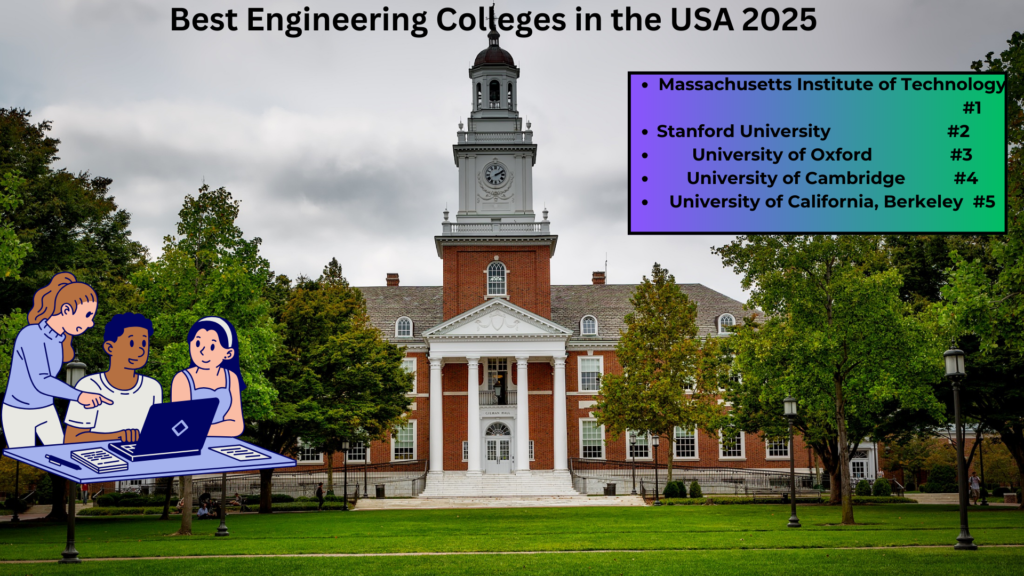
Best Engineering Colleges in the USA 2025
Engineering is one of the most sought-after fields of study worldwide, and the United States boasts some of the best engineering colleges globally. The year 2025 brings an updated perspective on institutions that continue to lead in academic excellence, research innovation, and career opportunities. Here is a detailed guide to the best engineering colleges in the USA in 2025.
1. The Organization of Innovation in Massachusetts (MIT)
Where: Cambridge, Massachusetts
Features: MIT has consistently beaten the rankings as the world’s head design school. It is a top decision for planned engineers because it requests an educational program, first-class teachers, and cutting-edge research offices.
Subject matters:
- Designing Precisely
- Designing and Software engineering
- Designing in Aviation
- Designing with power
Why Pick MIT? MIT presents unparalleled opportunities for experiential learning, innovativeness, and participation with business titans. Understudies are good to go for persuasive callings because of the college’s state-of-the-art labs and energetic, innovative culture.
2. Stanford University
Location: Stanford, California
Highlights: Nestled in the heart of Silicon Valley, Stanford University is renowned for its engineering programs that blend innovation with practical application.
Specializations:
- Computer Science
- Civil and Environmental Engineering
- Bioengineering
- Electrical Engineering
Why Choose Stanford? Stanford’s proximity to tech giants like Google, Apple, and Tesla provides students with unmatched internship and networking opportunities. Its interdisciplinary approach encourages collaboration across fields.
3. Caltech, or the California Foundation of Innovation
Area: California’s Pasadena
Features: Little class sizes and Caltech’s accentuation on research ensure a specific and superb instructive experience.
Subject matters:
- Designing in Aviation
- Designing Precisely
- Study of PCs
- Designing of Synthetic substances
Why Choose Caltech? Caltech creates engineers who make significant commitments to the progression of science and innovation in light of its focus on examination and advancement. Its small class size supports cozy connections among instructors and understudies.
4. University of California, Berkeley (UC Berkeley)
Location: Berkeley, California
Highlights: UC Berkeley consistently ranks among the top public universities in the world, offering exceptional engineering programs at an affordable cost for in-state students.
Specializations:
- Electrical Engineering and Computer Sciences (EECS)
- Civil Engineering
- Industrial Engineering
- Bioengineering
Why Choose UC Berkeley? Berkeley’s engineering programs are known for their academic rigor and emphasis on research. The university’s connections to the tech industry provide excellent career prospects.
5. Carnegie Mellon University (CMU)
Location: Pittsburgh, Pennsylvania
Highlights: CMU is celebrated for its cutting-edge programs in robotics, artificial intelligence, and software engineering.
Specializations:
- Computer Engineering
- Robotics
- Software Engineering
- Mechanical Engineering
Why Choose CMU? CMU’s interdisciplinary approach and strong ties to industry leaders make it a top choice for students interested in emerging technologies. Its well-funded research facilities attract talent from around the globe.
6. University of Illinois at Urbana-Champaign (UIUC)
Location: Urbana and Champaign, Illinois
Highlights: UIUC is known for its strong engineering programs and vibrant campus life.
Specializations:
- Electrical and Computer Engineering
- Aerospace Engineering
- Civil and Environmental Engineering
- Materials Science
Why Choose UIUC? UIUC offers a balance of academic excellence and campus engagement. The university’s alumni network includes numerous leaders in the engineering and technology sectors.
7. Georgia Institute of Technology (Georgia Tech)
Location: Atlanta, Georgia
Features: The design projects at Georgia Tech are famous for underlining certifiable applications and functional capacities.
Specializations:
- Industrial Engineering
- Mechanical Engineering
- Computer Engineering
- Electrical Engineering
Why Choose Georgia Tech? Georgia Tech’s co-op programs allow students to gain valuable industry experience while studying. Its location in Atlanta offers access to a growing tech ecosystem.
8. University of Michigan, Ann Arbor
Location: Ann Arbor, Michigan
Highlights: The University of Michigan is a powerhouse for engineering education, offering a broad array of specializations.
Specializations:
- Aerospace Engineering
- Biomedical Engineering
- Civil Engineering
- Computer Science and Engineering
Why Choose UMich? UMich is known for its collaborative environment and vast resources for student projects and research. Its strong emphasis on leadership and innovation prepares students for diverse career paths.
9. Purdue University
Where: West Lafayette, Indiana
Features: Known for its mechanical and advanced plane design disciplines, Purdue is a trailblazer in designing schooling.
Subject matters:
- Designing in Aviation
- Designing Precisely
- Designing with power
- Organic and Agrarian Designing
Why Pick Purdue? Understudies have exceptional work arrangement possibilities because of Purdue’s wide graduated-class organization and business associations. The college is a well-known decision due to its emphasis on quality and moderation.
10. University of Texas at Austin (UT Austin)
Location: Austin, Texas
Highlights: UT Austin combines academic excellence with a vibrant cultural environment, making it a favorite among engineering students.
Specializations:
- Petroleum Engineering
- Electrical and Computer Engineering
- Civil Engineering
- Mechanical Engineering
Why Choose UT Austin? UT Austin’s location in a booming tech hub provides students with numerous internship and employment opportunities. Its diverse and inclusive environment fosters a sense of community among students.
Factors to Consider When Choosing an Engineering College
- Accreditation: Ensure the college is accredited by recognized organizations like ABET.
- Specializations: Search out courses that supplement your expert targets.
- Research Opportunities: Choose colleges with strong research facilities and funding.
- Location: Consider proximity to tech hubs or industries relevant to your field.
- Cost and Financial Aid: Look at accessible grants and educational cost costs.
Final Thoughts
In 2025, designing understudies will have plenty of potential outcomes in the US. Each of these colleges has unique strengths and opportunities, ensuring that students can find a program tailored to their interests and aspirations. Whether you aim to innovate in technology, design sustainable systems, or lead groundbreaking research, these institutions provide the foundation for a successful engineering career.
